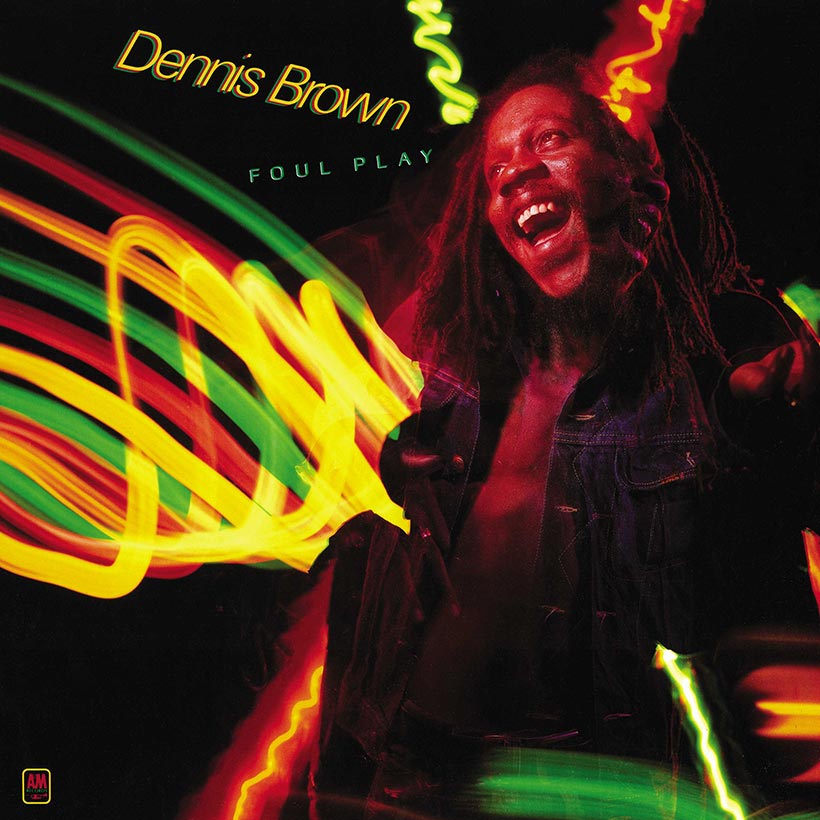A rough rule that reggae fans discover early on is not just to look at the name of the artist on a record that’s unknown to them, but to take notice of the people he’s working with. Reggae artists work with numerous producers in numerous studios; they might sound a certain way on one song, and completely different on another. This isn’t so much that the singer or DJ changes their performing style, but they’re placed in a different musical context. In some instances, this can be bad news; if an artist doesn’t have a strong vocal identity, their records can be hit or miss. That, however, never applied to Dennis Brown. You can bet that when Dennis took the mic in any context, he was giving his best. And that best was almost invariably excellent, as it was on his 1981 album Foul Play.
Listen to Foul Play on Apple Music and Spotify.
Musical dualism
Foul Play finds Dennis in the right company; the album is co-produced by Joe Gibbs, with whom a lot of Dennis Brown’s greatest glories of the 70s were made, and Clive Hunt, a producer associated with the highest-quality roots music. Reggae was shifting from the rockers style with which Dennis had been strongly associated in the second half of the 70s, and Dennis was moving accordingly. Foul Play delivers subtle changes from the sound Gibbs and Dennis had helped perfect on the likes of Words Of Wisdom and Joseph’s Coat Of Many Colours, classic albums of their era.
The album’s opening track, “On The Rocks,” is throbbing electro reggae that reflects wider shifts in black music, doubtless influenced by its writer Clive Hunt’s frequent presence in New York. Dean Fraser delivers sax lines that are typical of early 80s pop, and Dennis is totally comfortable singing a song about going for a boogie (yes, he uses that word, trendy in the soul clubs of the time, though almost unheard in reggae) to shake off tough times.
As if to reassure traditional fans, “The Existence Of Jah” follows immediately: a slow and serious militant tune that became a live favorite. Self-written, this could have come from any period of Brown’s career, as Dennis calls out Satan in that sweet and smoky voice. Then it’s straight back to the electro-skank for Hunt’s upbeat, almost ska-like “Come On Baby,” a musical dualism that is unusual to say the least.
In fine voice
Things settle down from this point. While some of the album sways towards the rub-a-dub style that was taking over in Jamaica, Foul Play becomes far more cohesive and typical of the man they called The Crown Prince Of Reggae. “The World Is Troubled” is a remake of one of his rockers-era classics, “Troubled World,” here given a subtle update with whirring Clavinet and a rub-a-dub rhythm. The horns-led “I Need Your Love,” aka “Rasta Children,” is serious roots reggae; the title track is aimed at the nightclubs without losing its Jamaican identity, and “Your Man” is high-stepping lovers rock that could have come from any time in the previous six years.
The final three offerings on the album are updates of older material: “If I Had The World” is from his juvenile early 70s tenure with Prince Buster, and the mature Brown handles the song beautifully. “If I Follow My Heart” was the title track of his second album, from 1971, and Dennis’ affection for the melody, now reworked in a rub-a-dub beat, is clear: his voice is tender and warm. “Cheater,” previously a 1972 single, is tackled in a very similar style to the original, with added wailing guitar and a mild update of the drum pattern. It’s a strange tale of washing stolen from a line – foul play, indeed.
It goes without saying that Dennis was in fine voice for this, the first of his three albums for A&M. The second is silkier and would deliver a hit single, but Foul Play, released on October 9, 1981, is for the most part a more rootsy offering. Those who have overlooked the album in favor of Brown’s more vaunted 70s work will be in for a treat when they catch up with it.



